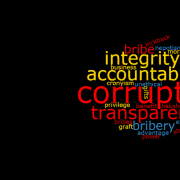|
Getting your Trinity Audio player ready...
|
Image: Flickr/GovernmentZA
By Karam Singh
Corruption remains one of the fault line issues in South Africa – if not the main one. Even in this time of natural disaster and tragic devastation that Mother Nature reaped on unprepared and unprotected communities, our thoughts turn quickly to corruption and how corrupt officials, politicians, their criminal connections and fake service providers will seek to exploit the opportunity.
The devastation caused by flooding in KwaZulu-Natal after days of incessant and unprecedented rainfall is widening the fault lines in the relationship of trust between the government and society. Fingers have already been pointed at the government for failing to protect communities from the effects of climate change, for relying on inadequate infrastructure and for making no plans to ensure their safety, following similar floods and events in the past. This is predictable and justified.
But what is startling are the red flags with regard to fears around impending corruption in the disbursement of relief aid and development contracts to rebuild the battered communities.
This time around, across the nation, civil society broadly, business and beyond are blowing the warning whistle on potential corruption before it has even happened.
It is not terribly surprising. There is a groundswell of concern from diverse quarters of South Africa and fears that the KwaZulu-Natal disaster relief funds will become subject to crony deals, rigged procurement and fake fly-by-night service providers, and fraudsters that loot the funds in cahoots with their political cronies and connections. What is notable is that these concerns emerge prior to the allocation and disbursement of funds and prior to any concrete allegations of corruption in the administration of this vital relief aid. It hasn’t happened yet but there is a fear about its inevitability, given the recent past.
Failing in its constitutional obligations
How have we come to the point where we are so distrustful of the government and its basic bona fides and capacity to provide relief to communities in the direst need of assistance?
The Constitution provides a high bar when it comes to understanding the government’s obligations to create a democratic and equal society based on the progressive realisation of basic rights such as housing, healthcare, nutrition, water and sanitation. However, after nearly three decades of democracy, we know full well that the government is failing to provide those basic services to its people adequately. While the social grant system is functional and allows millions to provide for some basic needs, there is an increasing frustration that the government is fundamentally incapable of providing relief to those who need it the most in their most difficult times, without that relief being subject to corruption and fraud. This is not only a legacy of the Covid-19 personal protective equipment (PPE) procurement and related corruption we saw over the past two years, but also feeds into a broader narrative around the government’s inability to provide basic services. This is against the backdrop of a decade-plus of formal state capture, for which we have yet to see any accountability by way of state capture-related prosecutions by the National Prosecuting Authority.
The situation has become so dire when it comes to this deep-seated distrust; the president himself tacitly acknowledged this when he announced the need to involve an entity like the Solidarity Fund in overseeing and administering relief funds for the flood victims. There has been a further acknowledgement in various quarters that other civil society entities, such as the Gift of the Givers, may be better placed than the government to receive donations from the public to support relief efforts.
Is there a way forward?
How can the government effectively begin to recover ground when it comes to the public’s faith in its ability to provide disaster relief in a manner which is above scrutiny and insulated from fraud and corruption? One suggestion is to ensure great structural transparency in the allocation and distribution of relief funding, by publishing all relevant information – including all information relating to those who contract with the government for goods and services related to disaster relief.
With the onset of Covid-19 corruption, we received assurances, most notably from the Gauteng government, that they would make public all Covid-19-related spending, and they did this for a period of time before abruptly ceasing to do so in mid-2021.
We must remember that following the National Treasury’s publication of data relating to Covid-19 spending, investigative journalists were able to uncover the irregular spending on the National Health Insurance communication strategy that became the Digital Vibes scandal. Thus, the best way to ensure that funds are correctly allocated and spent is to have systems in place that allow the government, oversight bodies and civil society to monitor that allocation and spending. And for effective monitoring to take place, there needs to be transparency in the system by way of publication of the information.
Activate oversight bodies
Besides the publication of relevant information, it is important that all relevant oversight bodies are activated, especially the Auditor-General, who can do real-time audits of spending and the provincial Standing Committee on Public Accounts (Scopa) and Parliament’s Scopa.
Disaster relief should be a core competency of any government as they are uniquely placed to mobilise resources to assist those most in need. But to avoid a repeat of the avarice and insensitivity revealed in the first months of the pandemic, lessons learnt from the PPE debacle and the subsequent publication of Covid-19-related spending must be put into practice right away, allowing those monitoring to pick up potential irregularities such as those that happened with Digital Vibes.
- This article was first published on News24







